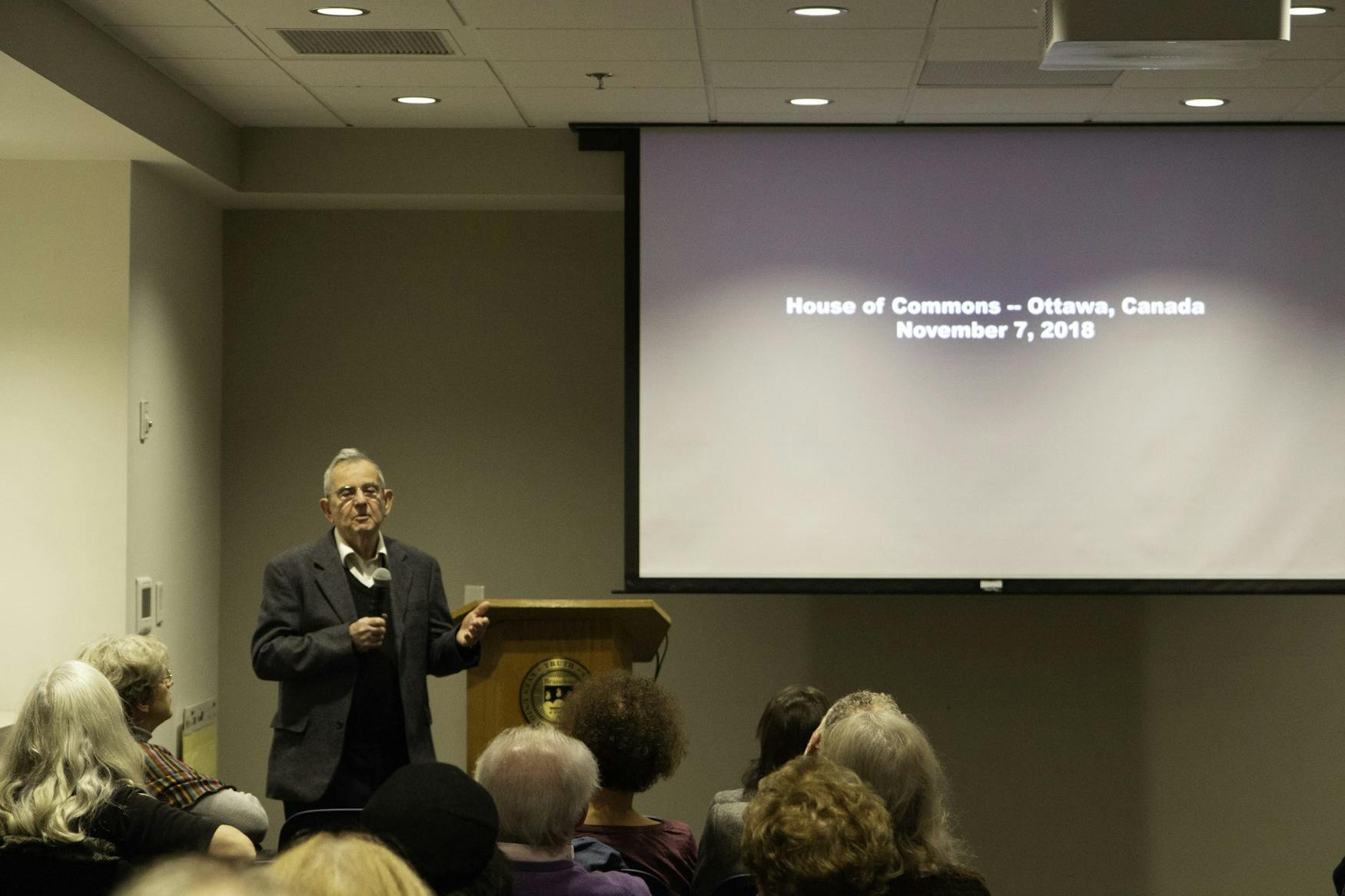Holocaust survivor remembers his family’s migration to Cuba
The Center for European and German Studies hosted the speaker for the 70th anniversary of Kristallnacht.
In commemoration of Kristallnacht, a Nazi pogrom that devastated and drastically threatened the autonomy, security and freedom of German Jews on the night of Nov. 9, 1939, the Center for German and European Studies hosted a conversation on Nov. 4 with Dr. Hans Fisher, who at the age of 11 was a passenger and survivor of the SS St. Louis.
According to the Jewish Virtual Library, amidst raging fear directed towards Jews after Kristallnacht, the SS St. Louis was an opportunity to escape the ensuing danger and persecution from the Nazi regime. Jewish refugees boarded the ship heading towards Havana, Cuba in hopes of finding safety while waiting to receive quota numbers to enter the United States.
The conversation with Fisher began with a preview of Robert M. Krakow’s documentary, “Complicit” (2013), a blend of footage and survivor interviews that tells the story of the Roosevelt administration’s WWII refugee policy. Many of the interviews detailed the predicament refugees faced while boarding the SS St. Louis. One survivor quoted his father’s tearful reaction to leaving his home behind, remembering his words as, “I am very happy to be leaving Germany, but I am thinking about all our relatives in Europe … God only knows when we will see them again.”
Fisher speaks in the documentary, describing the passenger’s reactions after their rejection from Cuba: “Everyone [was] shouting and crying … it was really pandemonium.” Later in the conversation, Fisher elaborated on the main reason for Cuba’s rejection of the ship, crediting the “not uncommon incident of corruption.” According to Fisher, Manuel Benitez Gonzalez, the Cuban Minister of Immigration at the time, collected between $300,000 and $500,000 from permits Jews bought to travel to Cuba. Fisher noted Benitez kept this money, money that also enticed Cuban President Federico Laredo Bru, who asked for a share. Benitez fled, leaving Bru bitter and unwilling to accept the refugees, Fisher said.
Wrapping up his segment in the documentary, Fisher further pointed out the youthful naïveté of his friend and fellow passenger who trusted that “President Roosevelt is gonna take care of us.”
After the short screening, Fisher shared his own story, detailing his family’s journey before boarding the ship, beginning with the acquisition of a permit to go to Cuba all the way to sponsorship to leave Germany through an affidavit. Once on the ship, Fisher described the passage as “really wonderful until we found out we would not be permitted to get off.” He said that once passengers were informed of the bad news, the mood completely shifted. There was a shortage of food and many passengers had lost the hope they had when fleeing Europe. Fisher recalled that the only words of encouragement were from the ship’s captain, “who publicly vowed he would not take the boat back to Germany.”
Fisher explained that passengers were randomly assigned to be dropped off in different countries, the luckiest of whom ended up in England, while the unluckiest ended up in Holland, where Nazis eventually rounded up passengers who settled in a vacant village to be sent to Auschwitz.
Fisher said he, his mother and his sister ended up moving to the small town of La Valle in France. “When we arrived there, I thought I was being transported back into the Middle Ages,” he said. “I don’t think I ever saw a car [and] cobblestone streets were everywhere.”
Fisher shared an anecdote in which a French man approached his mother to invite her to a party. He revealed the French man’s intentions behind the invitation were “because the local priest had been preaching for years that Jews had horns … and he had never seen a Jewish person before.”
Fisher explained that his family eventually had the opportunity to travel to Cuba again — this time with visas — on a ship carrying refugees fleeing Spain after its civil war. He and his family were the “only non-Spaniards on the ship,” he recalled. According to Fisher, the boat went to England in the beginning of December in 1939 and then to Ellis Island in New York. Because his family did not have the proper documentation to stay in the United States, they took another boat to Havana, where Fisher was reunited with his father, who had already been living in Cuba for some time. Fisher noted that the family eventually made it to the United States, settling in Vineland, New Jersey, once they acquired the proper documentation.




Please note All comments are eligible for publication in The Justice.